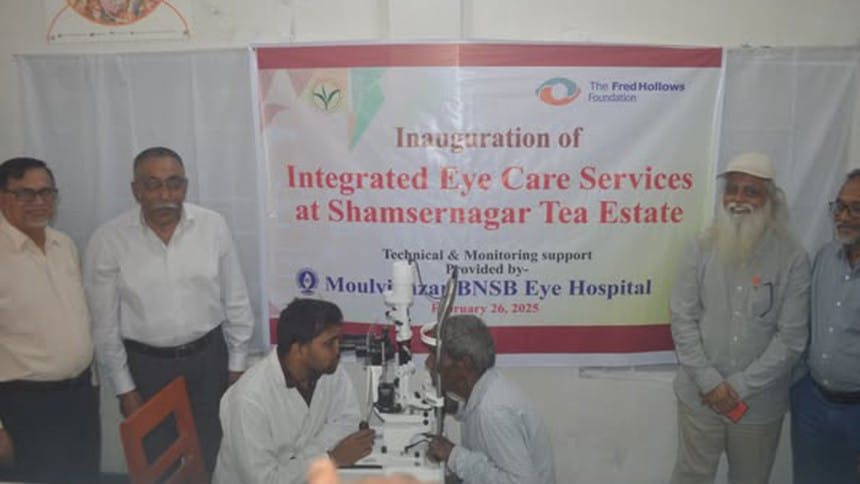BNSB eye hospital: Taking eyecare facilities to the masses

Sajna Begum, an elderly widow from Barlekha upazila of Moulvibazar, had lost her eyesight and was unable to perform even basic tasks on her own.
"I used to feel like a burden to my poor family…but not anymore. After regaining my eyesight, I feel as though my life has begun anew. Now, I can do my own work," she said.
Sajna's story is just one of around 27 lakh people across all age groups who have been benefitted by availing eye treatment in the Bangladesh National Society for the Blind (BNSB) Eye Hospital in Moulvibazar over the past 37 years.
At least 40 percent of the patients, who are primarily from marginalised underprivileged communities including tea workers and people from haor areas, received free medical care. Additionally, 25 percent of patients benefitted from partial discounts on treatment costs.
Since its inception in 1974, a total 14,57,417 patients have been treated in the outpatient department and 88,758 patients have undergone surgeries. Also, a total 7,34,621 patients have been treated through 1,660 free eye camps and 93,666 patients have been operated on. Moreover, the hospital treated some 2,81,724 students through 901 school visits, and 20,668 pediatric patients through 49 pediatric camps.
"BNSB hospital's operation began with eye treatment camps in Moulvibazar. In 1986, with support from the Ministry of Health and various domestic and international donors, the hospital expanded into a full-fledged institution in Matarkapan area," said its junior public relation officer Dewan Ruhul Amin Chowdhury.
To reach remote patients, the hospital now operates primary care centres in Kulaura, Shayestaganj, and Nabiganj upazilas, with plans for further expansions.
The hospital is now a beacon of hope for eradicating blindness and providing medical services to the poor, helpless, and underprivileged communities.
It boasts a dedicated team of 14 experienced doctors, 32 nurses, and 140 full-time staff. Its advanced facilities are A-Scan, B-Scan, laser treatment, one-stop cataract clinics, diabetic and glaucoma units, an ocular microbiological laboratory, intraocular lens services, and specialised pediatric care.
Additionally, the hospital also conducts free eye camps, sight testing programmes in schools, and training sessions for schoolteachers, religious leaders, and healthcare workers.
Visiting the hospital recently, this correspondent found it crowded in outpatient and inpatient departments.
"My mother's physical condition prevents her to be taken abroad for eye treatment, so I brought her here. I am satisfied with the treatment facilities in this hospital," said Jasim Uddin, a resident of London, UK.
"My mother has successfully undergone cataract surgery here and she can now see clearly. I am taking her home today," said Asim Kumar Mallick.
Orbis International and BNSB hospital jointly initiated Sylhet division's lone specialised pediatric eye department at the hospital in 2004.
Dr Shah Aminul Islam, a senior consultant, said, "Our pediatric department is technologically advanced. We treat a wide range of eye issues in children aged one day to 16 years old. People come not only from within Sylhet division but also from Netrakona, Brahmanbaria and Cumilla districts to avail our treatment facilities."
At present, the hospital operates with seven general cabins, 11 AC cabins, 31 general wards, a children's ward, and a camp ward for patients, said Abdul Hamid Mahbub, joint secretary of the hospital's 17-member executive committee.
The hospital was awarded the 'Disability Overcoming Award-2018' in recognition of its contribution.
In absence of specialised eye care facilities in the division apart from Sylhet Osmani Medical College Hospital, BNSB hospital's facilities to provide eye treatment to the ultra-poor and under-privileged people have been commendable.
Patients can register for specialist consultations for only Tk 100. The institution reinvests its earnings to support free and subsidised treatment for the poor and helpless, reaffirming its commitment to social welfare, said Dewan Ruhul Amin Chowdhury.

 For all latest news, follow The Daily Star's Google News channel.
For all latest news, follow The Daily Star's Google News channel. 



Comments